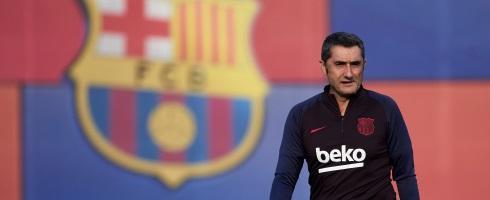It is a strange form of failure that sees a Coach win the league title in both full seasons with a club and yet be sacked with his team still top of the table. But this is FC Barcelona which, being more than a football club, demands more than simply winning championships.
It should have come as no surprise that Ernesto Valverde was fired or that the current board dealt with his departure with ugly disrespect. His tenure will be defined those two title wins contrasted with two gut-wrenching defeats in the second legs of Champions League matches: so close to glory but so far away. It might be odd that it was a defeat in the widely derided Spanish Supercopa that sounded his death knell but there was a depressing sense of déjà vu during Atletico Madrid’s late comeback.
Valverde has won five league titles in his career. Three came with Olympiakos who were the overwhelming force in Greek football at the time. Two more followed in Spain but a detractor could point out that he was up against a version of Real Madrid that seemed to have grown weary of the business of winning La Liga games week in week out.
He was never loved at the Camp Nou. The obsession with Barca Coaches having some bloodline connection with this living organism of a club was satisfied, just about, by his two years as a player from 1988 to 1990. His Athletic Bilbao side had been effective if uninspiring, finishing between fourth and seventh in each of his four seasons. That was higher than his predecessor Marcelo Bielsa had managed but while the Argentine had written poetry with Valverde it was only ever prose.
And now he finds himself damned for the wrong sort of success. Barca fans, you see, want it all – most of them anyway. That’s the deal. Maybe it is different for the locals but lots of the club’s gargantuan worldwide fanbase demand both success and style, which is fair enough. There are plenty of clubs they could have chosen that are nearer and cheaper if they had wanted to wrestle with the conundrum of pragmatism versus style. Cruyff managed it, Pep managed it and Luis Enrique managed it so by comparison Valverde looks like a functionary. Unfortunately, in the crazed furnace of social media such things are rarely debated rationally as fan boys take down traitors and vice versa.
So, is it unfair to brand Valverde as nothing but a value-extractor? If I took over as Liverpool manager I would win the Premier League title this season. If I took over as chief executive of Google I would record massive profits next year. In both cases I would walk around patting people on the back, saying ‘good job, keep it up,’ and then hide in my office and play Football Manager. How many Barca players improved in the last two and a half years? What evolution of playing style has there been? Or did Valverde take a look at Messi and say to himself ‘we’ll keep it tight and he’ll come up with something’?
The most damning thing I heard about Ernesto Valverde’s Barcelona wasn’t from the internet trolls but from my 12-year-old when he came home from playing football to watch football: “Do we have to watch Barca?” he asked. “They’re boring.”
Pragmatism soon becomes an excuse for lack of vision. Managers who are branded pragmatic have usually forgotten they’re in the entertainment industry and that doing just enough isn’t sustainable in the long-term for an institution that wants to poach fans from less grand clubs on every continent. And if it is all about the winning, make sure you do it all the time, or at least when it matters. Valverde’s Barca lacked the identity and strength of purpose to pass their toughest tests. Of course, everyone’s place in history depends to some extent on what happens when they’ve gone. If Quique Setien, Xavi and Ronald Koeman have all been sacked by the time Real Madrid lift their third straight La Liga trophy in 2022 then Barca fans will look back on this period as one of calm success. But right now, it feels like a good time to take leap into the future.

